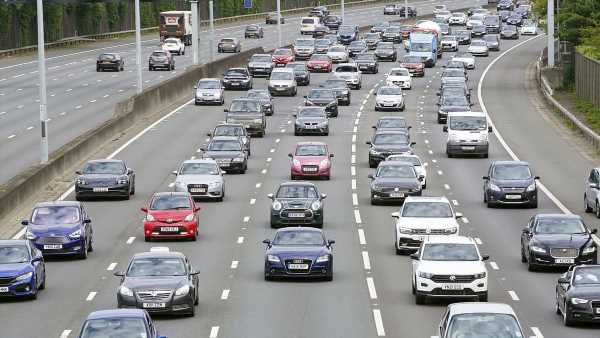
Nearly half a million untaxed cars are driving on Britain’s roads and almost a quarter of them have not had vehicle excise duty paid for six months, new figures reveal
- Department for Transport data shows 498,000 vehicles haven’t paid VED
Nearly half a million untaxed cars are driving on Britain’s roads and almost a quarter of them have not had vehicle excise duty paid for six months, new figures reveal.
Vehicle excise duty (VED) has not been paid for 498,000 registered vehicles, according to Department for Transport (DfT) data. This is equivalent to one in every 83 vehicles.
Nearly a quarter (24 per cent) of untaxed vehicles seen in traffic have had that status for more than half a year.
Nicholas Lyes, director of policy and standards at road safety charity IAM RoadSmart, said: ‘It will be hugely frustrating to the overwhelming majority of tax-paying drivers that almost half a million others are not paying their way.
‘Perhaps even more worrying is that a quarter of those that are dodging vehicle excise duty have been doing so for more than six months.
(Pictured: Vehicles queuing on the M25 in Surrey in 2022) Department for Transport figures have today revealed nearly half a million cars on the roads in the UK are untaxed
‘Untaxed vehicles are sometimes linked to much wider criminality and this has implications for safety on our roads.’
Northern Ireland has the highest rate of VED evasion in terms of vehicles used on roads, at 2.9 per cent. The rate across the UK as a whole is 1.3 per cent.
Steve Gooding, director of motoring research charity the RAC Foundation, said: ‘Leaving aside the loss of cash for the Chancellor, the worry for us all must be what else VED evaders are failing to do.
‘If they aren’t prepared to pay the duty what are the chances they’re also uninsured and unroadworthy with no MOT?
‘Some people may simply have forgotten to pay their VED for a week or two, or perhaps failed to update their records when they move house, but evasion on this scale could be a sign of more serious issues for road safety.’
Lost revenue from non-payment of VED has soared since the abolition of the paper tax disc in October 2014.
The DfT said it would not publish a new estimate for the amount of money lost due to concerns about the reliability of the methodology.
The latest annual estimate for Britain published two years ago put the figure at £114 million, up from £35 million in 2013/14.
Abolishing the paper disc removed the visual in-vehicle reminder of the expiry date for VED, although notifications are sent by the Driver and Vehicle Licensing Agency (DVLA).
The Government said at the time that the decision would eventually save the DVLA about £7 million a year.
The DVLA’s enforcement activity recovers some of the lost revenue from VED evasion.
(Pictured: Vehicles travelling on the M4 in July 2018) Nearly a quarter (24 per cent) of untaxed vehicles seen in traffic have had that status for more than half a year
DVLA chief executive Julie Lennard said: ‘As 98.7 per cent of vehicles on the road are taxed correctly, it is very clear that the vast majority of drivers make sure they do the right thing and ensure their vehicle is taxed.
‘However, we will continue our work to keep evasion rates low by continuing to make vehicle tax easy to pay but hard to avoid.’
Every vehicle registered in the UK must be taxed if it is driven or parked on a public road. The amount varies based on a vehicle’s CO2 emissions.
Failing to pay typically leads to an £80 fine, although if a case goes to court the maximum penalty is £1,000.
The DfT said its evasion figures are not comparable with those from previous years because of an improvement in identifying the movement of personalised number plates between vehicles.
Source: Read Full Article

